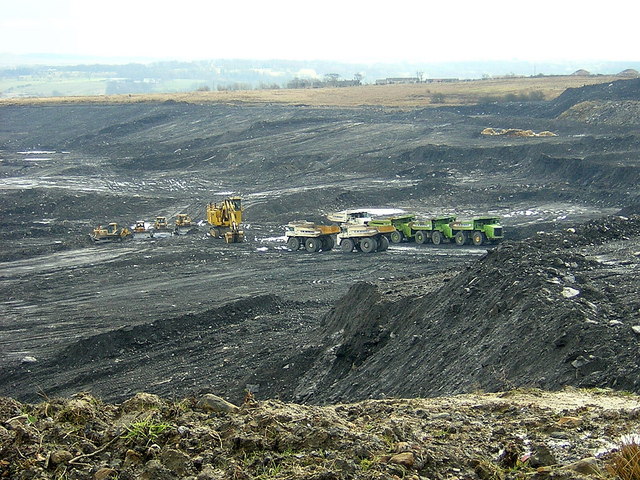Coal usage for electricity generation to end by October 2024
|
This photograph shows the Opencast coal mine near Plains, Scotland. |
Contents |
[edit] Introduction
On 30 June 2021, Energy and Climate Change Minister Anne-Marie Trevelyan announced that as of 1 October 2024, Great Britain will no longer use coal to generate electricity.
The policy change brings the deadline forward by one year and is part of the Government’s plans to transition away from fossil fuels and decarbonise the power sector. It will not apply to non-electricity generating coal consumers, such as the steel industry, nor to domestic coal mines.
[edit] Background
Coal is considered to be one of the most carbon intensive fossil fuels and is responsible for the creation of harmful air pollution. By eliminating the use of coal in electricity generation, the UK hopes to play a role in limiting the global temperature increase to 1.5 degrees.
On 18 September 2017, following a consultation in November 2016, the Government confirmed that it would proceed with action to regulate for the closure of unabated coal power generation units in Great Britain by 1 October 2025. On 4 February 2020, the Prime Minister announced the Government’s intention to bring forward the deadline for phasing out unabated coal generation to 1 October 2024.
The Government ran a consultation from 14 December 2020 to 26 February 2021 seeking views on proposals to achieve this objective. The analysis found that setting a closure date of either 2025 or 2024 would most likely not have a significant impact on the UK coal mining sector predominantly due to the fact that coal mining in the UK has already been in decline in recent years.
In March 2021, coal-fired power plants did not participate in the four-year ahead Capacity Market auction. The auction secures the electricity capacity Great Britain needs to cope with peaks in demand in 2024 - 2025. Coal power plants will not participate in any future Capacity Market auctions due to the introduction of Emissions Limits to the Market.
[edit] Transitioning away from coal
The UK has reduced the use of coal across the power sector, with coal accounting for only 1.8% of the electricity mix in 2020, compared with 40% almost a decade ago. Ending unabated coal generation in 2024 will mean the country will have reduced coal usage from almost a third of its electricity supply in 2014 to zero in 2024.
In 2020, the UK went 5,000 hours without coal-fired electricity. During that period, the country generated 43.1% of its electricity from renewable sources including wind (24.2%), bioenergy (12.6%), solar (4.2%) and hydro (2.2%). Coal only consisted of 1.8 % of the year’s electricity generation, and nuclear generation made up a further 16.1%.
In early 2021, the country broke a new wind power record, with just over a third of the country’s energy coming from wind.
The rise in the use of renewables - thanks to competition, free enterprise and government incentives to kick start new technologies - has in turn helped to drive down the cost of green energy, with coal power now more expensive in most countries.
[edit] Related articles on Designing Buildings Wiki
Featured articles and news
Reform of the fire engineering profession
Fire Engineers Advisory Panel: Authoritative Statement, reactions and next steps.
Restoration and renewal of the Palace of Westminster
A complex project of cultural significance from full decant to EMI, opportunities and a potential a way forward.
Apprenticeships and the responsibility we share
Perspectives from the CIOB President as National Apprentice Week comes to a close.
The first line of defence against rain, wind and snow.
Building Safety recap January, 2026
What we missed at the end of last year, and at the start of this...
National Apprenticeship Week 2026, 9-15 Feb
Shining a light on the positive impacts for businesses, their apprentices and the wider economy alike.
Applications and benefits of acoustic flooring
From commercial to retail.
From solid to sprung and ribbed to raised.
Strengthening industry collaboration in Hong Kong
Hong Kong Institute of Construction and The Chartered Institute of Building sign Memorandum of Understanding.
A detailed description from the experts at Cornish Lime.
IHBC planning for growth with corporate plan development
Grow with the Institute by volunteering and CP25 consultation.
Connecting ambition and action for designers and specifiers.
Electrical skills gap deepens as apprenticeship starts fall despite surging demand says ECA.
Built environment bodies deepen joint action on EDI
B.E.Inclusive initiative agree next phase of joint equity, diversity and inclusion (EDI) action plan.
Recognising culture as key to sustainable economic growth
Creative UK Provocation paper: Culture as Growth Infrastructure.
Futurebuild and UK Construction Week London Unite
Creating the UK’s Built Environment Super Event and over 25 other key partnerships.
Welsh and Scottish 2026 elections
Manifestos for the built environment for upcoming same May day elections.
Advancing BIM education with a competency framework
“We don’t need people who can just draw in 3D. We need people who can think in data.”
























